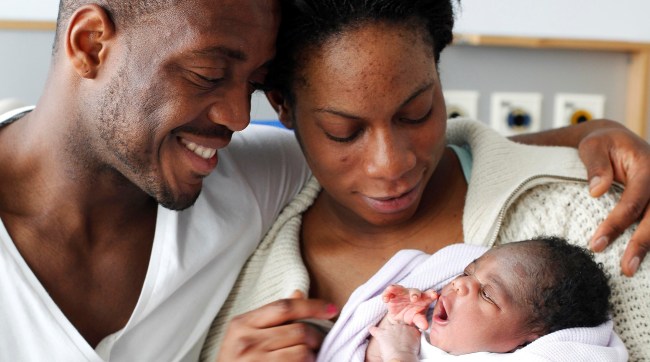

- #Black baby born with tail how to
- #Black baby born with tail skin
In addition, damp feather down exposes the vent, potentially putting the chick at risk of pecking from other birds. A chill could bring on another round of pasting. Keeping the chicks warm is important because young chicks are not quite able to regulate their body temperature and are at a high risk of chill when wet. Then use a hair dryer on low heat, held at least 8 inches from the chick, to finish drying the feathers, being careful not to burn the sensitive skin.
Dry the chick: Once the chick is cleaned up, use a clean, soft towel to remove excess water. 
If a few feathers come out, that is normal just do your best to leave as many feathers as you can.
#Black baby born with tail skin
Be gentle it is very easy to pull off feathers and skin if you are not patient and gentle. Once the mass is softened, use warm water to gently work the mass from the chick. If manure is dry and cemented to the down, use a cotton swab and apply a small amount of vegetable oil to help soften the mass. Young chicks are easily chilled, so it is important to minimize the area of the bird that gets wet. Do not attempt to pull off dried manure from the vent, as you will risk tearing the skin and feathers. When the manure is softened, softly use a cotton swab in a downward motion to help remove the material. Another option is to gently hold the chick in your hand and run the rear end under warm (not hot!) water to loosen dried manure.
Clean the vent: If you determine the chick is pasting, one technique is to use a warm, wet wash cloth to help remove the material. Baby chicks have a bellybutton that is located close to the vent the vent is just below the tail, while the belly button (navel) is further down towards the belly and legs. Examine the vent: First, be sure you are examining the vent and not the bellybutton. 
#Black baby born with tail how to
If you notice chicks have pasty butt, follow these steps of how to take care of a sick baby chick:

Check each chick for pasting as soon as they arrive home. It is not unusual for chicks that are shipped through the mail or purchased at a farm store to have pasting. Pasty butt: Sick baby chick symptoms and care
Acclimation to solid food to solid food from the yolk while inside the eggĬoccidiosis or other parasite infections that cause loose stools may be an indirect issue if the birds are pasting. That is around the time that the birds are producing their own digestive enzymes at peak production along with the fact that the bird and the vent are getting larger.Īdditional reasons for pasting may include: This is why the issue typically clears itself around 10 days of age. It also corresponds with the fact that the bird’s own digestive enzymes aren’t being produced in enough quantity to break down feed. Thus, it sticks to the back end of the bird. Ingredients that are poorly digested cause the digesta in the intestine to get thicker or more viscous, which makes it stickier. The biggest cause of this issue is due to poorly digestible ingredients. Pasting can be caused by several factors, often stemming from stress. Fortunately, the condition is easily treatable, and recovery is fairly quick, if the situation is tackled immediately. Most birds that exhibit signs of pasty butt will grow out of the condition in 7 to 10 days. The condition is common in baby chicks, and not typically seen in adult birds, although adults can be affected. (The vent is the outside opening of the cloaca, located just beneath the tail through which waste is excreted.) Most common in young chicks, pasting is a condition where droppings stick to a chicken’s vent area, preventing the excretion of waste and creating a potentially fatal situation. One possible issue is called pasty butt, also known as pasting, pasted vent or pasting up. From travel and new environments to new feed, chicks may become stressed and can become ill. With the right complete starter-grower feed, your strong chicks should grow quickly - doubling their hatch weight in the first week and growing up to seven times their hatch weight in the first month.ĭuring their first few days, chicks often experience many more changes than just quick growth. The condition is easily treated, and recovery can be quick if action is taken promptly.Ī happy, productive backyard flock starts with strong, healthy baby chicks. This is a condition where droppings stick to a chick’s vent area, preventing excretion of waste. Pasty butt or chick pasting up is a common reason for a sick baby chick, most often caused by stress.








 0 kommentar(er)
0 kommentar(er)
